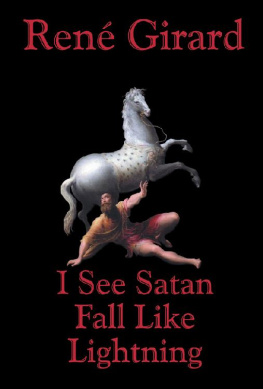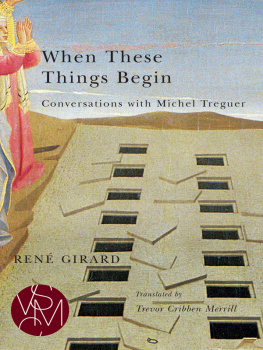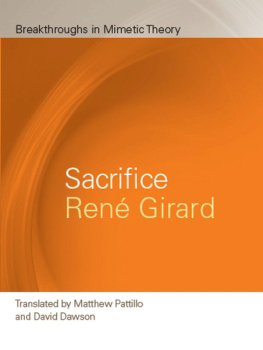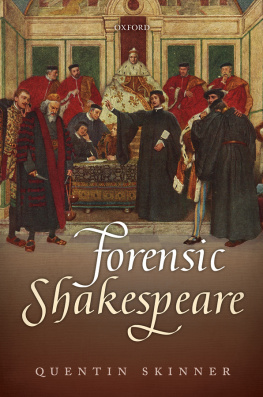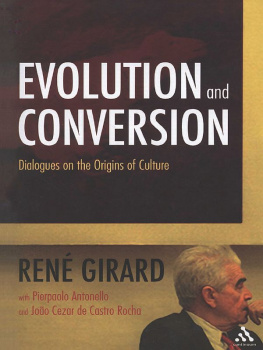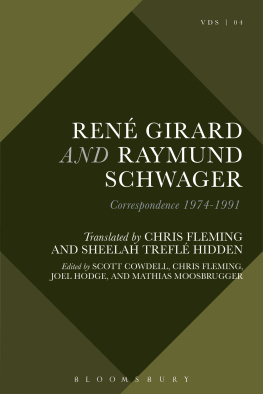Rene Girard - A Theater of Envy: William Shakespeare
Here you can read online Rene Girard - A Theater of Envy: William Shakespeare full text of the book (entire story) in english for free. Download pdf and epub, get meaning, cover and reviews about this ebook. genre: Children. Description of the work, (preface) as well as reviews are available. Best literature library LitArk.com created for fans of good reading and offers a wide selection of genres:
Romance novel
Science fiction
Adventure
Detective
Science
History
Home and family
Prose
Art
Politics
Computer
Non-fiction
Religion
Business
Children
Humor
Choose a favorite category and find really read worthwhile books. Enjoy immersion in the world of imagination, feel the emotions of the characters or learn something new for yourself, make an fascinating discovery.

- Book:A Theater of Envy: William Shakespeare
- Author:
- Genre:
- Rating:3 / 5
- Favourites:Add to favourites
- Your mark:
- 60
- 1
- 2
- 3
- 4
- 5
A Theater of Envy: William Shakespeare: summary, description and annotation
We offer to read an annotation, description, summary or preface (depends on what the author of the book "A Theater of Envy: William Shakespeare" wrote himself). If you haven't found the necessary information about the book — write in the comments, we will try to find it.
A Theater of Envy: William Shakespeare — read online for free the complete book (whole text) full work
Below is the text of the book, divided by pages. System saving the place of the last page read, allows you to conveniently read the book "A Theater of Envy: William Shakespeare" online for free, without having to search again every time where you left off. Put a bookmark, and you can go to the page where you finished reading at any time.
Font size:
Interval:
Bookmark:

A Theater of Envy
William Shakespeare
Ren Girard

ST. AUGUSTINE'S PRESS
South Bend, Indiana
Copyright 1991 by Oxford University Press
Originally published in hardcover by Oxford University Press, Inc., and reprinted by arrangement with Oxford University Press, Inc., 198 Madison Avenue, New York, NY 10016.
All rights reserved. No part of this book may be reproduced, stored in a retrieval system, or transmitted, in any form or by any means, electronic, mechanical, photocopying, recording, or otherwise, without the prior permission of St. Augustines Press.
3 4 5 6 21 20 19
Library of Congress Cataloging in Publication Data
Girard, Ren, 1923
A theater of envy: William Shakespeare / Ren Girard.
p. cm.
Originally published: New York: Oxford University Press, 1991.
Includes index.
ISBN 1-58731-860-1 (alk. paper)
1. Shakespeare, William, 15641616 Knowledge Psychology. 2. Psychoanalysis and literature England History 16th century. 3. Psychoanalysis and literature England History 17th century. 4. Drama Psychological aspects. 5. Mimesis in literature. 6. Desire in literature. 7. Envy in literature. I. Title. II. Series
PR3065.G57 2002
822.3'3 dc21
2002069967
The paper used in this publication meets the minimum requirements of the American National Standard for Information Sciences Permanence of Paper for Printed Materials, ASNI Z39.48-1984 .
St. Augustines Press
www.staugustine.net
ISBN-13: 978-1-58731-864-1 (electronic)
Myth and Ritual in A Midsummer Nights Dream , Harry F. Camp Memorial Lectures (Stanford University, November 1972), 117.
To Entrap the Wisest: A Reading of The Merchant of Venice , in Literature and Society , ed. Edward W. Sad (Baltimore, Md.: The Johns Hopkins University Press, 1980), 100119.
Hamlets Dull Revenge, Stanford Literature Review 1 (Fall 1984), 159200.
The Politics of Desire in Troilus and Cressida , in Shakespeare and the Question of Theory , ed. Patricia Parker and Geoffrey Hartman (London: Methuen, 1985), 188209.
Bottoms One-Man Show, in The Current in Criticism , ed. Clayton Koelb and Virgil Lokke (West Lafayette, Ind.: Purdue University Press, 1987), 99122.
Jealousy in The Winters Tale , in Alphonse Juilland: Dune passion lautre , Stanford French and Italian Studies 53 (Saratoga, Calif.: Anma Libri, 1987), 3962.
Love Delights in Praises: A Reading of The Two Gentlemen of Verona , Philosophy and Literature (Autumn 1989), 23147.
Do You Love Him Because I Do!: Mimetic Interaction in Shakespeares Comedies, in Ren Girard and Western Literature , special issue of Helios 17, no. 1 (Spring 1990), 89108.
Croyez-voux vous-mme votre propre thorie? La Rgle du Jeu 1 (June 1990), 25477.
The Crime and Conversion of Leontes in The Winters Tale , Religion & Literature (October 1990).
Collective Violence and Sacrifice in Shakespeares Julius Caesar , The Bennington Chapbooks in Literature (Bennington College, Vt., 1990).
Envy of So Rich a Thing: The Rape of Lucrece , in Festschrift for Albert Cook (Saratoga Springs, N.Y.: Skidmore College, 1990).
Tis Not So Sweet Now As It Was Before: Orsino and Olivia in Twelfth Night , in Proceedings of the symposium Paradoxes of Self-Reference held at Stanford University, May 2021, 1988, special issue of Stanford Literature Review 7, nos. 12 (1990).
W ith thousands of books about Shakespeare already on library shelves, anyone attempting to write a new one should begin with a profuse apology. My excuse will be the usual one: an irrepressible love of the subject. I would be disingenuous, though, if I claimed that this love is as gratuitous and disembodied as Immanuel Kant recommends in his writings on aesthetics.
My work on Shakespeare is inextricably linked to everything I ever wrote, beginning with an essay on five European novelists. I loved these so equally and impartially that, in my blissful ignorance of literary fashion, which imperiously demands that critics look for what makes their chosen writers absolutely singular, unique, peerless, and incomparabletotally isolated, in other words, from all other writersI gambled on the possibility that my five novelists might have something in common. A shocking thought, to be sure, but in my eyes at least, the gamble paid off; I discovered something and called it mimetic desire.
When we think of those phenomena in which mimicry is likely to play a role, we enumerate such things as dress, mannerisms, facial expressions, speech, stage acting, artistic creation, and so forth, but we never think of desire. Consequently, we see imitation in social life as a force for gregariousness and bland conformity through the mass reproduction of a few social models.
If imitation also plays a role in desire, if it contaminates our urge to acquire and possess, this conventional view, while not entirely false, misses the main point. Imitation does not merely draw people together, it pulls them apart. Paradoxically, it can do these two things simultaneously. Individuals who desire the same thing are united by something so powerful that, as long as they can share whatever they desire, they remain the best of friends; as soon as they cannot, they become the worst of enemies.
The perfect continuity between concord and discord is as crucial to Shakespeare as it was to the tragic poets of Greece, serving as a rich source of poetic paradox as well. If their work is to outlast fleeting fashionability, dramatists as well as novelists must discover this fundamental source of human conflict,namely mimetic rivalryand they must discover it alone, with no help from philosophers, moralists, historians, or psychologists, who always remain silent on the subject.
Shakespeare discovered the truth so early that his approach to it seems juvenile, even caricatural, at first. In the still youthful Rape of Lucrece , his potential rapist, unlike the original Tarquin of the Roman historian Livy, resolves to rape a woman he has never actually met; he is drawn to her solely by her husbands excessive praise of her beauty. I suspect that Shakespeare wrote this scene just after discovering mimetic desire. He was so taken with it, so eager to emphasize its constitutive paradox, that he created this not entirely unbelievable but slightly disconcerting monstrosity, a totally blind rape, just as we say a blind date.
Modern critics intensely dislike this poem. As for Shakespeare, he quickly realized that to wave mimetic desire like a red flag in front of the public is not the sure road to success (as I myself have never managed to learn, I suppose). In no time at all, Shakespeare became sophisticated, insidious and complex in his handling of desire, but he remained consistently, even obsessively, mimetic.
Shakespeare can be as explicit as some of us are about mimetic desire, and has his own vocabulary for it, close enough to ours for immediate recognition. He says suggested desire, suggestion, jealous desire, emulous desire, and so forth. But the essential word is envy, alone or in such combinations as envious desire or envious emulation.
Like mimetic desire, envy subordinates a desired something to the someone who enjoys a privileged relationship with it. Envy covets the superior being that neither the someone nor something alone, but the conjunction of the two, seems to possess. Envy involuntarily testifies to a lack of being that puts the envious to shame, especially since the enthronement of metaphysical pride during the Renaissance. That is why envy is the hardest sin to acknowledge.
Font size:
Interval:
Bookmark:
Similar books «A Theater of Envy: William Shakespeare»
Look at similar books to A Theater of Envy: William Shakespeare. We have selected literature similar in name and meaning in the hope of providing readers with more options to find new, interesting, not yet read works.
Discussion, reviews of the book A Theater of Envy: William Shakespeare and just readers' own opinions. Leave your comments, write what you think about the work, its meaning or the main characters. Specify what exactly you liked and what you didn't like, and why you think so.

